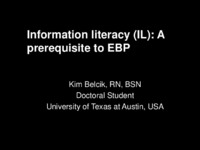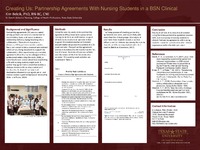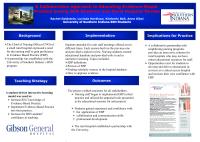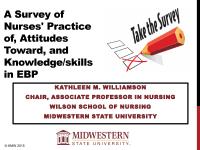| dc.contributor.author | Belcik, Kimberly Dawn | en |
| dc.date.accessioned | 2011-10-26T13:49:22Z | |
| dc.date.available | 2011-10-26T13:49:22Z | |
| dc.date.issued | 2011-10-17 | |
| dc.identifier.uri | http://hdl.handle.net/10755/155415 | |
| dc.description.abstract | <p><strong>Purpose:</strong> Information literacy is an ambiguous term that many professionals in various fields, including nursing, have attempted to define. It is emphasized as a skill nurses should have yet it has not been conceptualized within nursing. The purpose of this paper is to analyze the concept of information literacy. This analysis emphasizes information literacy in the context of nursing as a prerequisite to evidence-based nursing practice.</p>
<p><strong>Methods:</strong> The method used to analyze the concept is the Walker and Avant method. All steps of the Walker and Avant method are used with the exemption of the invented and illegitimate cases in line with the philosophy of Rodgers. The invented and illegitimate cases are addressed in the form of a related case. The social context of the concept is addressed in implications for theory, research, and practice.</p>
<p><strong>Findings:</strong> A theoretical definition of information literacy was derived from the literature. It is a self-directed, independent ability to locate access and/or retrieve information efficiently from available sources, evaluating the quality of the information and managing and organizing the information while understanding the implications of doing so. Seven antecedents and eight consequences of the concept were identified. A model case describes a nurse using the Internet to help her patient make a decision about diagnostic testing. A contrary case describes a nurse attempting to find information on medications. The related case presents a nurse using critical thinking skills to care for a post-operative patient. The Information and Communications Technology (ICT) Literacy Assessment by the Educational Testing Service is presented as an empirical referent.</p>
<p><strong>Conclusions:</strong> Considering the findings, information literacy is a skill nurses should have as a prerequisite to evidence-based nursing practice.</p> | en |
| dc.description.sponsorship | Sigma Foundation for Nursing | en |
| dc.format | Text-based Document | en |
| dc.language.iso | en | en |
| dc.subject | Information Literacy | en |
| dc.subject | Evidence-based Nursing Practice | en |
| dc.subject | Nursing Skills | en |
| dc.title | Information literacy: A prerequisite to evidence-based nursing | en |
| dc.type | Presentation | en |
| dc.rights.holder | <p>
All rights reserved by the author(s) and/or publisher(s) listed in this item record unless relinquished in whole or part by a rights notation or a Creative Commons License present in this item record.
</p><p>
All permission requests should be directed accordingly and not to the Sigma Repository.
</p><p>
All submitting authors or publishers have affirmed that when using material in their work where they do not own copyright, they have obtained permission of the copyright holder prior to submission and the rights holder has been acknowledged as necessary.
</p> | en |
| dc.description.note | <p>Author's dissertation on same topic located at http://hdl.handle.net/10755/621225 Items submitted to a conference/event were evaluated/peer-reviewed at the time of abstract submission to the event. No other peer-review was provided prior to submission to the Henderson Repository.</p> | |
| dc.type.category | Full-text | en |
| dc.evidence.level | N/A | en |
| dc.research.approach | N/A | en |
| dc.contributor.department | Chi Psi | en |
| dc.author.details | Kimberly Dawn Belcik, PhD | en |
| dc.date.conferenceyear | 2007 | |
| dc.contributor.affiliation | Texas State University, Round Rock, Texas, USA | en |
| dc.description.reviewtype | Abstract Review Only: Reviewed by Event Host | en |
| dc.description.acquisition | Proxy-submission | en |





